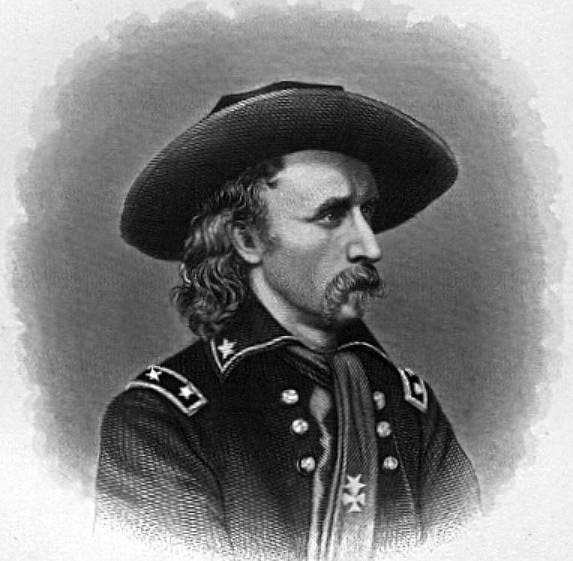Home |
Contents |
Photos |
News |
Reviews |
Store |
Forum |
ICI |
Educators |
Fans |
Contests |
Help |
FAQ |
Info


They Lied in They Died
(8/2/06)
 I watched They Died With Their Boots On last night: a 1941 biopic of George Armstrong Custer starring Errol Flynn. It's actually pretty good, with the flamboyant Flynn well-cast as the flamboyant Custer. The first half is especially entertaining, with its fictionalized version of Custer's career at West Point and in the Civil War.
I watched They Died With Their Boots On last night: a 1941 biopic of George Armstrong Custer starring Errol Flynn. It's actually pretty good, with the flamboyant Flynn well-cast as the flamboyant Custer. The first half is especially entertaining, with its fictionalized version of Custer's career at West Point and in the Civil War.
The second half of Custer's life isn't just fictionalized, it's fabricated. There's no mention of Custer's years as Indian fighter or his role in the Washita massacre. Instead, the film skips to Custer's posting in the Dakotas, where he captures Crazy Horse singlehandedly (didn't happen) and later gives his word that the Sioux can keep the Black Hills (didn't happen). Custer's enemies invent rumors of gold to cause a stampede of speculators (didn't happen—there really was gold in the Black Hills, and Custer was largely responsible for the ensuing gold rush). Custer goes to Washington to testify on the Indians' behalf (!). "The sanctuary of the red race is being violated," he says. "If I were an Indian, I'd fight beside Crazy Horse to the last drop of my blood." (Didn't happen, needless to say.)
You have to keep watching to see how the movie resolves this conundrum: If Custer is such a friend of the Indians, how does he end up fighting them to the death? Well, the movie asserts that the Sioux have already killed many of General Terry's troops. Incredibly, Custer supposedly sacrifices himself to save the rest of Terry's men. It's us or Terry, he declares.
Custer dies the glorious death he wanted, and it isn't in vain. "Terry's troops would've been wiped out," General Sheridan concludes. "The squatters massacred, the whole frontier, overrun, Bismarck itself destroyed." Instead, the government will honor Custer's last wish: to "make good its promise to Chief Crazy Horse. The Indians must be protected in their right to an existence in their own country."
Whew! From anti-Indian fighter to pro-Indian fighter. If this isn't the tallest tale ever told in a movie, I don't know what is. Portraying George Washington as a British agent or Abe Lincoln as a slaveowner would be no more of a lie.
Naturally, the Indians fare badly. They skulk, they steal, they surrender, they slaughter. Except for a speech by Crazy Horse (Anthony Quinn) demanding the Black Hills, there's no sense of the Indians' life, culture, or motivation. They're essentially what someone first labels them: "bloodthirsty savages."
For more on the movie's inaccuracies, see Alvin M. Josephy Jr.'s comments in the book Past Imperfect—summarized in Hollywood History. Nevertheless, I give this film a 8.0 of 10 for its entertainment value. As one critical reviewer said, "[E]ven if historical erroneousness intermittently undermines the film's outlandish attempts at lionization, They Died With Their Boots On endures as one of the finest Flynn-de Havilland collaborations."
To read about Custer in the Stereotype of the Month contest, go to Site Blames Indian "Mutilations" for Custer's Campaigns.
Related links
The best Indian movies
* More opinions *
|
|
. . .
|

|
Home |
Contents |
Photos |
News |
Reviews |
Store |
Forum |
ICI |
Educators |
Fans |
Contests |
Help |
FAQ |
Info
All material © copyright its original owners, except where noted.
Original text and pictures © copyright 2007 by Robert Schmidt.
Copyrighted material is posted under the Fair Use provision of the Copyright Act,
which allows copying for nonprofit educational uses including criticism and commentary.
Comments sent to the publisher become the property of Blue Corn Comics
and may be used in other postings without permission.
 I watched They Died With Their Boots On last night: a 1941 biopic of George Armstrong Custer starring Errol Flynn. It's actually pretty good, with the flamboyant Flynn well-cast as the flamboyant Custer. The first half is especially entertaining, with its fictionalized version of Custer's career at West Point and in the Civil War.
I watched They Died With Their Boots On last night: a 1941 biopic of George Armstrong Custer starring Errol Flynn. It's actually pretty good, with the flamboyant Flynn well-cast as the flamboyant Custer. The first half is especially entertaining, with its fictionalized version of Custer's career at West Point and in the Civil War.